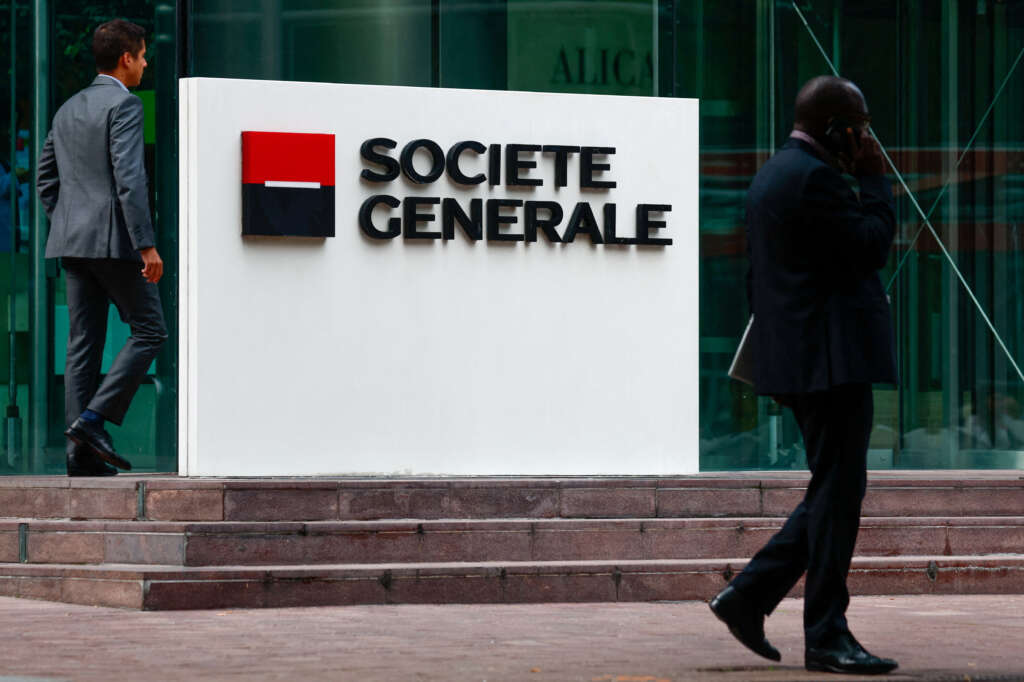
LONDON/DUBLIN (Reuters) -Societe Generale’s much-hyped new strategy plans were given a thumbs down by investors on Monday, underscoring uncertainty over European banks as they face a brittle economy.
As a year-long boon from interest rate rises fizzles, Europe’s big lenders are under a spotlight, with higher rates now upping pressure on borrowers, threatening to prick a property price bubble and further slow the wider economy.
Against this backdrop, shares in France’s third-largest listed bank tumbled by about 12% after its newly appointed CEO said he expected little if any growth in annual sales over the coming years, as he outlined a plan investors deemed lacklustre.
“We are at a crossroads,” said Jerome Legras of Axiom Alternative Investments, pointing to interest rate uncertainty.
“There are more questions about the future and the economy,” Legras said, adding that transformative mergers between banks, which investors have waited for in vain, remained unlikely.
That dampens the prospects for Europe’s banks, whose valuations are low and static, said one adviser who works with top executives from the region’s lenders, adding that investors struggle to see much promise for the sector.
Slawomir Krupa, who took over as SocGen chief executive in May, has been charged with reviving the bank. But he made clear on Monday that the scope for revenue growth was little to none.
Krupa’s plan and predictions, which he described as “honest” and realistic, dismayed analysts. One said rumours in the run-up to the announcement, including of the sale of sluggish businesses, had stoked expectations of a more far-reaching plan.
“This is the right plan for the bank for decades to come,” Krupa told journalists when asked about SocGen’s sharp share price drop in response to his strategy.
MALAISE
Europe’s banks, which operate across a patchwork of countries, each with their own governments and local rules, have long lagged their U.S. competitors.
In a recent study, European Central Bank economists put this down to big U.S. banks’ dominance of global investment banking, as well as the burden on their European rivals of bad loans dating back to the global financial crisis.
Europe has long been criticised for failing to quickly clean up after 2008, a perception that has rubbed off on its banks, although it did make reforms, such as beefing up supervision.
Stress tests earlier this year showed a lingering malaise and the weakness of several German banks in particular.
Of the 14 German banks tested for capital, eight fell short of the European Union average. Those that were above were primarily subsidiaries of U.S. banking giants, such as Goldman Sachs and JP Morgan.
And compounding the problem, Europe’s economy is slowing and falling behind the United States.
Earlier this month, the European Commission cut its economic forecasts for the 19 countries using the euro, predicting the bloc would see only modest growth and that Germany, its economic engine, would even shrink this year.
“At some point, you’re going to have a credit crunch and inevitably a risk of (borrower) defaults,” said Frederic Rozier, an investor at Mirabaud, which has invested in U.S. banks.
European banks’ modest earning power has dampened investor appetite for their shares, which often trade at just a fraction of book value – the sum of their assets.
While in the United States, JP Morgan and Morgan Stanley are valued at around 1.5 times book value, Germany’s Deutsche Bank, Dutch lender ABN Amro, France’s Credit Agricole and Britain’s Standard Chartered are valued at just half book value or less.
Karel Lannoo of Brussels think tank CEPS blames Europe’s fragmented approach to regulating finance.
“We need a single banking market,” he said. “We still don’t have it.”
(Additional reporting by Elisa Martinuzzi; Writing by John O’Donnell; Editing by Alexander Smith)


